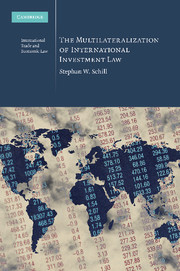Book contents
- Frontmatter
- Contents
- Preface
- List of figures
- Table of treaties, draft instruments, and related documents
- Table of cases
- I Introduction: globalization and international investment law
- II The dynamics of multilateralism and bilateralism in international investment relations
- III Treaty negotiation and multilateralization of international investment law
- IV Multilateralization through most-favored-nation treatment
- V Multilateralization and corporate structuring
- VI Multilateral enforcement of international investment law
- VII Multilateralization through interpretation: producing and reproducing coherence in investment jurisprudence
- VIII Conclusion: multilateralization – universalization – constitutionalization
- Bibliography
- Index
VI - Multilateral enforcement of international investment law
Published online by Cambridge University Press: 06 January 2010
- Frontmatter
- Contents
- Preface
- List of figures
- Table of treaties, draft instruments, and related documents
- Table of cases
- I Introduction: globalization and international investment law
- II The dynamics of multilateralism and bilateralism in international investment relations
- III Treaty negotiation and multilateralization of international investment law
- IV Multilateralization through most-favored-nation treatment
- V Multilateralization and corporate structuring
- VI Multilateral enforcement of international investment law
- VII Multilateralization through interpretation: producing and reproducing coherence in investment jurisprudence
- VIII Conclusion: multilateralization – universalization – constitutionalization
- Bibliography
- Index
Summary
The multilateralization of international investment law and the emergence of uniform principles of investment protection are not only a matter of the resemblance of treaty texts, of the operation of MFN clauses, and of the effects of corporate structuring. They are also championed by the rules on investor-State dispute settlement. At a time when capital-exporting and capital-importing States were still unable to agree on a common set of substantive rules for international investment relations, above all the appropriate level of protection of foreign investors, they agreed, by concluding the ICSID Convention in the mid-1960s, to establish multilateral rules for the procedural aspects of investor-State disputes. Genuine multilateralism in this context presumably worked because States agreed that investor-State dispute settlement constituted a valuable institution, even though they disagreed on the extent of restrictions to be imposed on States regarding the treatment of foreign investors.
Although the ICSID Convention is not the only procedural framework under which investment treaty arbitration can take place, it remains the most important one, having governed 62 percent of the 290 investment treaty-based disputes known by the end of 2007. Furthermore, the ICSID Convention illustrates best the importance of the procedural framework for the multilateralization of international investment law. For this reason, the following chapter concentrates on investor-State dispute settlement under the ICSID Convention.
Notwithstanding its exclusively procedural scope, the ICSID Convention contributes significantly to the multilateralization of international investment law. Already from a formal perspective, it establishes a uniform framework for the settlement of investor-State disputes.
- Type
- Chapter
- Information
- The Multilateralization of International Investment Law , pp. 241 - 277Publisher: Cambridge University PressPrint publication year: 2009
- 1
- Cited by



